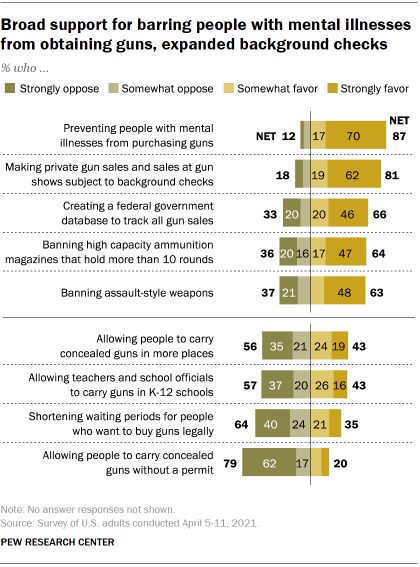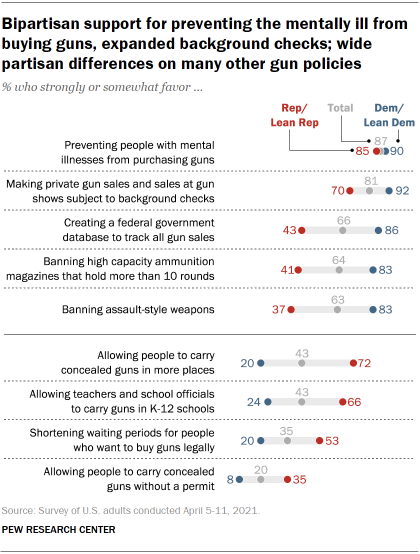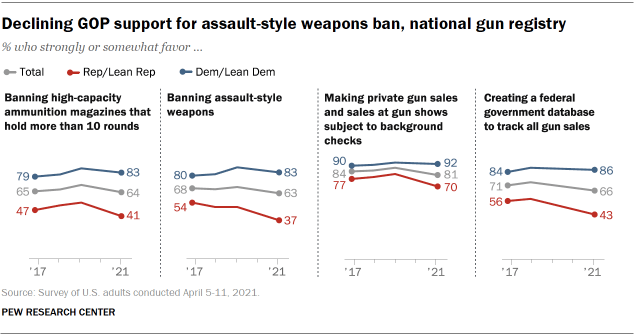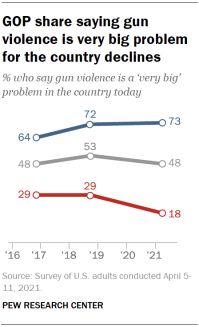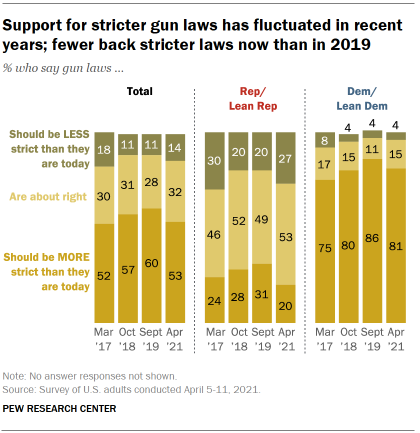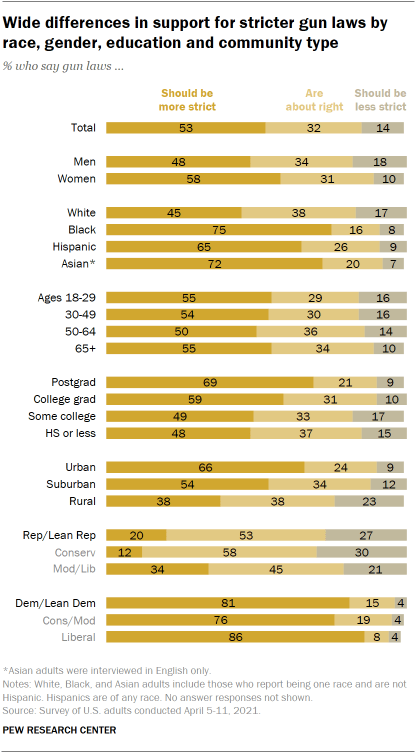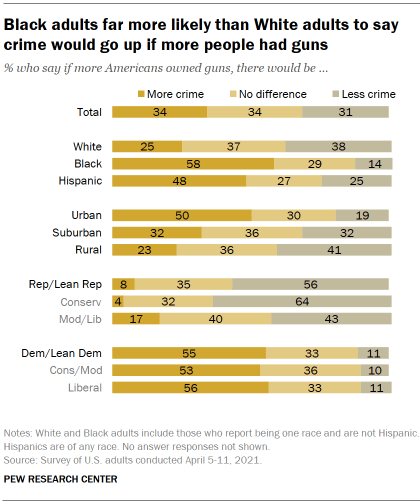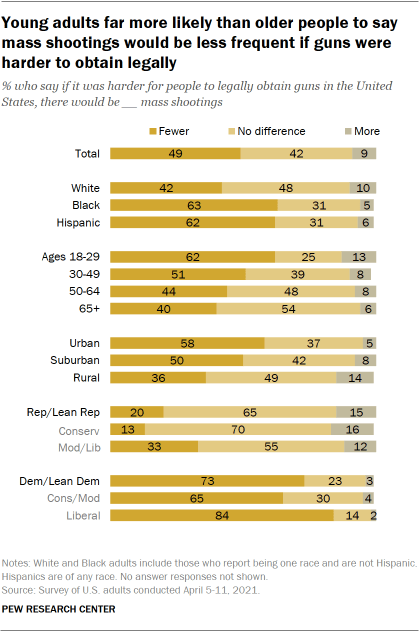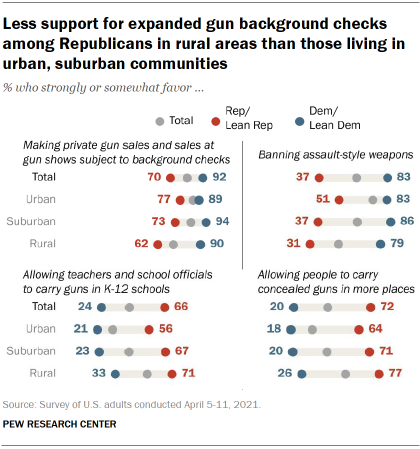BLUF:
Share of Americans who favor stricter gun laws has declined since 2019
Amid a Series of Mass Shootings in the U.S., Gun Policy Remains Deeply Divisive
Declining support among Republicans for ban on assault-style weapons, national gun registry
In an era marked by deep divisions between Republicans and Democrats, few issues are as politically polarizing as gun policy. While a few specific policy proposals continue to garner bipartisan support, the partisan divisions on other proposals – and even on whether gun violence is a serious national problem – have grown wider over the last few years.
Today, just over half of Americans (53%) say gun laws should be stricter than they currently are, a view held by 81% of Democrats and Democratic-leaning independents but just 20% of Republicans and Republican leaners. Similarly, while nearly three-quarters of Democrats (73%) say making it harder to legally obtain guns would lead to fewer mass shootings, only 20% of Republicans say this, with most (65%) saying this would have no effect.
The new national survey by Pew Research Center, conducted from April 5-11, 2021 among 5,109 adults, finds that 73% of Democrats consider gun violence to be a very big problem for the country today, compared with just 18% of Republicans who say the same. The current partisan gap on this question is 11-percentage-points wider than in 2018 and 19 points wider than in 2016.
Note: This survey was conducted after eight people were killed in the Atlanta area on March 16 and 10 people were killed in Boulder, Colorado on March 22. It was fielded before a shooting in which eight people were killed in Indianapolis on April 15.
Overall, several gun policy proposals continue to draw broad support from Americans. Nearly nine-in-ten (87%) favor preventing people with mental illnesses from purchasing guns, while 81% favor subjecting private gun sales and sales at gun shows to background checks.
Smaller though still sizeable majorities of Americans support the creation of a federal database tracking all gun sales (66%) and bans on high capacity magazines (64%) and assault-style weapons (63%).
Meanwhile, four policies aimed at easing gun restrictions – allowing people to carry concealed guns in more places, allowing K-12 teachers and school officials to carry guns in schools, shortening waiting periods for purchasing guns, and allowing people to carry concealed guns without a permit – all face more opposition than support in the public.
But there are very few areas of bipartisan agreement across the nine proposals asked about in the survey.
Two policies that would restrict access to guns garner clear majority support from both Republicans and Democrats: preventing those with mental illnesses from purchasing guns (supported by 85% of Republicans and 90% of Democrats) and subjecting private gun sales and gun show sales to background checks (70% of Republicans, 92% of Democrats).
And there is widespread opposition in both parties to allowing people to carry concealed firearms without a permit.
But while 80% or more Democrats favor creating a federal database to track gun sales and banning both assault-style weapons and high capacity magazines, these proposals are each favored by roughly 40% of Republicans, with majorities of Republicans in opposition.
Conversely, while wide majorities of Republicans support allowing people to carry concealed guns in more places (72%) and allowing primary and secondary teachers and officials to be armed in K-12 schools (66%), these proposals are overwhelmingly opposed by Democrats (only about 20% favor either).
Several of these partisan gaps also are now wider than they have been in recent years. Although Democratic opinion is little changed since 2017, GOP support for an assault-style weapons ban has dropped substantially, from 54% in 2017 and 50% in 2019 to 37% today.
Similarly, Republican support for a federal gun sale database is 13 percentage points lower than it was in 2017. There have been more modest Republican shifts away from support for ban on high-capacity ammunition magazines and background checks for private and gun show sales.
And while gun violence ranks as one of the top problems facing the nation among Democrats – with 73% saying it is a “very big problem” for the country – it ranks far lower for Republicans, with just 18% saying this.
Democrats have long been more likely than Republicans to characterize gun violence this way, but the share of Democrats viewing gun violence as a very big problem has risen over the last several years, while the share of Republicans saying this has declined.
Share of Americans who favor stricter gun laws has declined since 2019
A narrow majority of U.S. adults (53%) say that gun laws should be stricter than they are today. About a third (32%) say that gun laws are currently about right, and 14% say they should be less strict than they are today.
The share who say gun laws should be stricter has decreased since September 2019, when six-in-ten Americans said this. Current views are essentially the same as they were four years ago, when 52% of adults said guns laws should be stricter, 30% said they were about right and 18% said they should be less strict.
About half of Republicans and Republican leaners (53%) say that gun laws are currently about right. Republicans are now more likely to say that gun laws should be less strict (27%) than they are to say they should be more strict (20%).
This is a reversal since 2019, when a larger share of Republicans favored stricter gun laws than less strict laws (31% vs. 20%). Since then, the share of Republicans favoring stricter gun laws has declined 11 percentage points.
A large majority of Democrats and Democratic leaners (81%) say gun laws should be stricter than they are today, though the share who say this has declined slightly since 2019 (from 86%).
Within the political parties, there are ideological differences in views of gun laws. Liberal Democrats are 10 percentage points more likely than conservative or moderate Democrats to say that gun laws should be more strict, though large majorities of both groups say this.
Among Republicans, most conservatives (58%) say that gun laws today are about right. Conservatives are much more likely to say that gun laws should be less strict (30%) than they are to say they should be stricter (12%). By comparison, slightly fewer than half of moderate and liberal Republicans (45%) say that gun laws are currently about right. And unlike conservative Republicans, moderate and liberal Republicans are more likely to say gun laws should be stricter (34%) than to say they should be less strict (21%).
There also are substantial demographic differences in support for stricter gun laws. For example, a majority of women (58%) say that gun laws should be more strict, compared with about half of men (48%).
Majorities of Black adults (75%), Asian adults (72%) and Hispanic adults (65%) say that gun laws should be stricter, compared with 45% of White adults. About four-in-ten White adults (38%) say that gun laws are about right; 17% say they should be made less strict.
Adults with college degrees are much more likely than those without college degrees to support stricter gun laws. Nearly seven-in-ten adults with postgraduate experience (69%) and nearly six-in-ten who have a college degree but no postgraduate experience (59%) say gun laws should be more strict, compared with about half of those with some or no college experience (48%).
Americans are also divided based on the types of communities they live in. About two-thirds of those who say they live in urban areas (66%) say gun laws should be stricter, while 24% say they are about right and just 9% say they should be less strict. Among those who describe their communities as suburban, a slim majority (54%) favor stricter gun laws. And those who say they live in rural communities are equally likely to say gun laws should be more strict or that they are currently about right (38% each). About a quarter (23%) say they should be less strict.
Age differences on this question are relatively modest. Nearly identical shares of adults ages 50 and over (52%) and those under 50 (54%) say that gun laws should be stricter than they are today. However, those over 50 are slightly more likely to say current gun laws are about right (35%) than younger adults (30%).
Public divided over impact of gun availability on crime
The public is divided on whether an increase in the number of Americans who own guns would result in more – or less – crime. And there is a division of opinion on the possible impact of making guns harder to legally obtain on the number of mass shootings in the U.S.
On crime, 34% say if more people owned guns, there would be more crime. Nearly as many (31%) say this would lead to less crime. Another 34% say increasing the number of people who own guns would make no difference for crime levels.
Black and Hispanic adults are more likely than White adults to say that if more Americans owned guns there would be more crime. A majority of Black adults (58%) and about half of Hispanic adults (48%) say this, compared with only a quarter of White adults.
Republicans and Democrats differ starkly on this question. A 55% majority of Democrats say there would be more crime if more people owned guns, while a similar majority of Republicans (56%) say there would be less crime.
While there are no substantial ideological differences among Democrats in these views, there are differences within the GOP. A majority of conservative Republicans (64%) say if more Americans owned guns there would be less crime. Among moderate Republicans, about as many say that there would be less crime (43%) or no difference in crime (40%) if more Americans owned guns.
Americans’ views on this question also vary by geography. Half of those living in urban areas say if more Americans owned guns there would be more crime. Adults in suburban and rural areas are less likely to say this (32% and 23% respectively). About four-in-ten adults who live in rural areas say that if more Americans owned guns there would be less crime, compared with 32% of those in suburban areas and just 19% of adults living in urban areas.
About half say making it harder to legally obtain guns would result in fewer mass shootings
Nearly half of Americans (49%) say there would be fewer mass shootings if guns were more difficult to obtain legally; about as many say either this would have no difference on the number or mass shootings (42%), or that they would increase (9%).
About six-in-ten of Black (63%) and Hispanic (62%) adults say that if it was harder to obtain guns, there would be fewer mass shootings.
By comparison, White adults are roughly as likely to say there would be fewer mass shootings (42%) if it was harder to obtain guns as they are to say there would be no difference (48%).
Adults under 30 are most likely to say making it harder to obtain guns would lead to fewer mass shootings: About six-in-ten adults ages 18-29 (62%) say this, compared with 51% of those ages 30-49, 44% of those 50-64 years of age and 40% of those over the age of 65.
There are deep partisan divides on the possible impact of making it harder to legally obtain guns on the frequency of mass shootings. While a large majority of Democrats (73%) say that if it were harder to legally obtain guns there would be fewer mass shootings, only 20% of Republicans say the same. Nearly two thirds of Republicans (65%) say there would be no difference if it were harder to obtain guns.
Among adults living in urban areas, a 58% majority say that making guns harder to legally obtain would lead to fewer mass shootings. Half of adults living in suburban areas and 36% living in rural areas say the same.
Democrats are far more likely than Republicans to strongly favor limits on gun availability
Support for several gun policy proposals – including expanded gun background checks and an assault weapons ban – is much greater among Democrats than Republicans. And for the most part, the share of Democrats who strongly favor these proposals far exceeds the share of Republicans who do so.
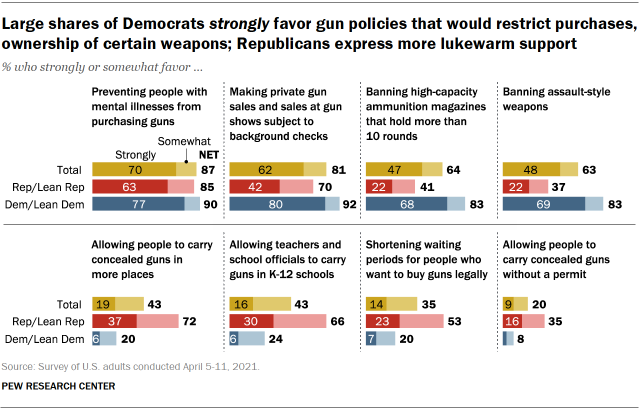
This is evident in opinions about making private gun sales and sales at guns shows subject to background checks. An overwhelming share of Democrats (92%) favor this proposal, as do a substantial but smaller majority of Republicans (70%). Yet while 80% of Democrats say they strongly favor expanded background checks on gun sales, only 42% of Republicans say the same.
A far smaller share of Republicans (37%) than Democrats (83%) favors banning assault-style weapons. Among the Democrats who support such a ban, most favor it strongly; 69% of Democrats say they strongly favor a ban on assault weapons, while just 15% somewhat favor it. By contrast, just 22% of Republicans strongly favor an assault weapons ban, while 16% somewhat favor it.
Even on a broadly popular proposal – preventing people with mental illnesses from purchasing guns, which is supported by 90% of Democrats and 85% of Republicans – Democrats are more likely than Republicans to be strongly in favor (77% vs. 63%).
Republicans express far more support for allowing people to carry concealed guns in more places (72%), allowing teachers and school officials to carry guns in K-12 schools (66%), and shortening waiting periods for people who want to buy guns legally (53%). But compared with Democrats’ strong support for more restrictive gun policies, Republicans express more tepid support for any of these. Just 37% of Republicans say they strongly support concealed carry in more places, while three-in-ten say they strongly support allowing teachers and officials to carry guns in schools.
In contrast, Democrats strongly oppose these same measures. For example, 56% say they strongly oppose allowing people to carry concealed guns in more places, while 54% strongly oppose allowing K-12 teachers and officials to carry guns in schools.
Views on gun policies vary by partisanship and community type
While partisan differences are far and away the biggest factor in attitudes about guns, views of several gun policies also vary substantially by geography. In part, this is itself due to differences in the partisan complexion of urban, suburban and rural places in the United States, with urban areas trending more Democratic in recent years and rural areas trending more toward the GOP. But even within each party – and particularly within the Republican Party – attitudes toward gun policies vary by geography. Those living in rural places typically favor more expansive access to guns, while those in urban places favor more restrictive policies.
For example, about half (51%) of Republicans and Republican-leaning independents who describe their communities as urban favor bans on assault-style weapons, compared with 31% of Republicans living in rural areas. Rural Republicans are also substantially more likely than their urban counterparts to favor allowing teachers and other school officials to carry guns in K-12 schools (71% of rural Republicans compared with 56% of those living in urban places).
Democrats and Democratic leaners living in rural places are also somewhat more likely than those living in urban places to support expansive gun policies (or less likely to favor restrictive ones). For example, about a third (33%) of rural Democrats support allowing teachers and other school officials to carry guns, compared with 21% of those in urban areas.
Americans living in urban areas are much more likely than rural Americans to say gun violence is a very big problem in the country
About half of adults (48%) say that gun violence is a very big problem in the country today, though the shares who say this are much higher among Democrats, Black adults and adults who describe their communities as urban.
About eight-in-ten Black adults (82%) say that gun violence is a very big problem, compared with nearly six-in-ten Hispanic adults (58%) and about four-in-ten White adults (39%). Democrats are much more likely than Republicans to identify gun violence as a very big problem (73% of Democrats vs. 18% of Republicans). However, racial differences persist among Democrats. Though clear majorities of Black (86%), White (72%), and Hispanic Democrats see gun violence as a very big problem for the country today, Black Democrats are more likely than White and Hispanic Democrats to say this.
Nearly two-thirds of Americans who report living in urban areas say that gun violence is a very big problem, compared with about half of suburbanites (47%) and only about a third of those who live in rural areas (35%). Majorities of all three groups say that gun violence is either a very big problem or a moderately big problem.

